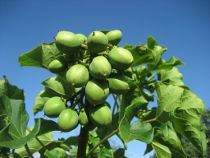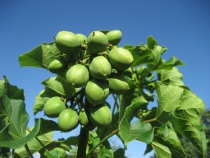Contoversy concerning African biomass production
A recently published, controversial report has argued that planting biofuel crops in Africa will not harm food security

 A recently published, controversial report has argued that planting biofuel crops in Africa will not harm food security. The report uses case studies from six African countries to emphasise their argument that not only will the expansion of the biomass industry in Africa not damage food production it could even enhance food security and provide a better income to farmers. Rocio Diaz-Chavez, a researcher at Imperial College, London, states:
A recently published, controversial report has argued that planting biofuel crops in Africa will not harm food security. The report uses case studies from six African countries to emphasise their argument that not only will the expansion of the biomass industry in Africa not damage food production it could even enhance food security and provide a better income to farmers. Rocio Diaz-Chavez, a researcher at Imperial College, London, states:
"If approached with the proper policies and processes and with the inclusion of all the various stakeholders, bioenergy is not only compatible with food production but can greatly benefit agriculture in Africa."
It has been asserted that with an appropriate approach and the correct considerations a balance can be drawn that will mean that investment in the expansion of biofuels will not impinge upon the food security of African countries. It has been determined that there is enough land to allow increased production of crops for biofuel without affecting food production. Food and Agriculture Organization (FAO) representative, Ms Louise Setshwaelo has expressed that:
"Biofuel production need not compete with food production if bio-fuel demand generates increased incomes for farm households, and this in turn is invested in raising productivity of all farm activities, including food production."
However there are mixed opinions about this viewpoint. Africa is already looking to increase its agricultural production by 6% so many believe that countries should be concentrating on this target rather than pushing to increase biofuel production. Africa as a continent has a food deficit and food security is therefore an important issue that needs to be taken into account when considering growing crops for fuel instead of food. Monty Jones, executive director of Forum for Agricultural Research in Africa (FARA) claims that, "We need to keep the land for food rather than raise crops for energy."
Senegal has chosen to go ahead with biofuel production, preferring to concentrate on both food and fuel in order to provide the country with a better energy supply and to improve farmers' incomes. Improved energy supply could enhance agricultural capabilities and is considered necessary for countries to achieve a modern energy infrastructure. Macoumba Diouf, director general of the Senegalese Agriculture Research Institute said:
"We need low-cost energy to drive our agriculture and at the same time ensure that our farmers grow food and earn income from growing jatropha on a contract basis."
It is clear that the report has proved controversial and that there are mixed opinions flying around as to what route should be pursued. The opportunity for development and an improved energy supply must be taken into account withoiy forgetting the risk such a move could have upon Africa's food security and agricultural business on a local level.
Author: Rachael Bristow | Climate Action
Image: tonrulkens | Flickr






